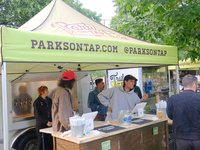As Philadelphia public schools sent students home early Tuesday to beat the mid-90s heat, questions about how to keep cool amid rising temperatures have become a growing public health concern.
For the third straight year, 2016 registered as the hottest year on record, a trend the NOAA's chief climatologist says will continue as we keep "punching at the ceiling" on an annual basis. President Donald Trump's withdrawal from the Paris climate accord only complicates the federal government's stance toward policies to manage climate change, even as defiant U.S. cities reaffirm their commitment to achieving the agreement's sustainability targets.
- RELATED ARTICLES
- John Oliver blasts 'idiots like' Pa. Sen. Scott Wagner for climate change beliefs
- Pittsburgh to Trump: You don't speak for us on climate
- Surviving the heat: Tips to stay cool
On a day-to-day, practical level, a hotter climate will likely put the nation's most vulnerable populations at serious risk of heat-related illnesses. In Philadelphia, a city with the highest rate of deep poverty in the United States, financial inability to obtain or pay for air conditioning could pose a growing threat for families and health officials.
Pennsylvania Public Utility Commissioner David Sweet, speaking at an event hosted by the Greater Philadelphia Chamber of Commerce last Friday, suggested that the state may look in the future to extend its winter heating assistance program to the summer months, according to a State Impact report.
"I think that’s an area we have to look at to see if we can encourage additional government assistance in some way for the summer months as well as the winter months,” Sweet said.
The Low-Income Heating Assistance Program (LIHEAP), a federal social services program established in 1981, is funded through congressional appropriations and distributed to states and other territories through block grants. In Pennsylvania, LIHEAP eligibility depends on whether household income falls below specified thresholds, although crisis and emergency assistance are also available.
On an annual basis, the program could save a typical resident $200-$300 per year. About 75,000 Philadelphia residents rely on LIHEAP to get through the winter months.
Currently, 22 states, including New York and New Jersey, offer similarly structured cooling assistance programs, some with an emphasis on weatherization to improve energy efficiency in low-income households.
Trump signaled in his March budget proposal that he plans to cut funding for LIHEAP, a move Sweet said would tear away approximately $350 million per year for Pennsylvania's low-income residents.
Sweet suggested a Pennsylvania cooling assistance program could eventually be funded through incentives for utilities. Other states choose to divert heating assistance funds to the summer months.
In the meantime, Philadelphia operates cooling centers to accommodate at-risk elderly residents in the midst of heat waves, which claimed four lives in 2016. A spokesperson for the city's Office of Sustainability told State Impact there are no immediate plans to request state LIHEAP funds for cooling assistance.
Sweet warned that if Trump's proposed LIHEAP cut gets approved, the burden will likely be absorbed by states and general utility customers.






